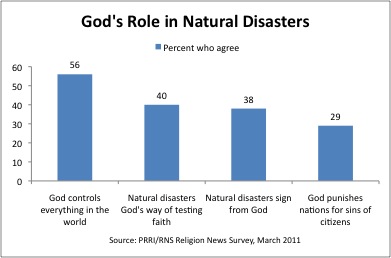 When people seek to defend the idea that God is violent “because the Bible says so,” what they are really doing is allowing the violent portrayals of God in the Bible to override and trump the loving and merciful portrayals of God elsewhere in Scripture, even when both portrayals are talking about the same historical event.
When people seek to defend the idea that God is violent “because the Bible says so,” what they are really doing is allowing the violent portrayals of God in the Bible to override and trump the loving and merciful portrayals of God elsewhere in Scripture, even when both portrayals are talking about the same historical event.
Though both depictions of God are equally inspired, many biblical interpreters choose to let the violent depiction of God override and trump the loving depiction. In this way, it is not a matter of just believing the Bible; it is a matter of choosing which passages take precedence.
This practice is especially shocking when it comes to the revelation in Jesus Christ. Although Jesus is the ultimate revelation of God—the Word of God incarnate—many Bible teachers and writers allow the violent portrayals of God in the Old Testament to override and trump the completely non-violent revelation of God in Jesus Christ.
When people want to defend a violent and vengeful God, they typically jump right over Jesus and go straight to Old Testament texts.
But isn’t this backwards?
 If a basic rule of hermeneutics is that the simpler and clearer texts should override the more difficult and troubling texts, and if Jesus Christ is the image of the invisible God so that He can say “if you have seen Me, you have seen the Father,” why do we choose to let the more troubling, difficult, and violent texts override and trump the loving, merciful, and Christlike texts?
If a basic rule of hermeneutics is that the simpler and clearer texts should override the more difficult and troubling texts, and if Jesus Christ is the image of the invisible God so that He can say “if you have seen Me, you have seen the Father,” why do we choose to let the more troubling, difficult, and violent texts override and trump the loving, merciful, and Christlike texts?
It is not a matter of one approach considering the whole counsel of God while the other approach neglects certain portions. No, both approaches consider the whole counsel of God. It’s a matter of choosing which parts of Scripture trump, interact with, and explain the other parts of Scripture.
As I continue to seek to understand the violent portrayals of God in the Old Testament, my approach has been to see Jesus Christ as the interpretive principle, the guiding ethic, the hermeneutical trump card of all of the Word of God.
Why?
Because Jesus is the Word of God.
No matter which text we consider, the basic questions are these: Does it look like Jesus? If not, how can we understand this text in light of Jesus? Or, how can we explain and apply this text in a way that looks more like Jesus? And ultimately, how can we apply this text so that it inspires us to love and live like Jesus?
 How can a God who says "Love your enemies" (Matthew 5:44) be the same God who instructs His people in the Old Testament to kill their enemies?
How can a God who says "Love your enemies" (Matthew 5:44) be the same God who instructs His people in the Old Testament to kill their enemies?
These are the sorts of questions we discuss and (try to) answer in my online discipleship group. Members of the group can also take ALL of my online courses (Valued at over $1000) at no charge. Learn more here: Join the RedeemingGod.com Discipleship Group I can't wait to hear what you have to say, and how we can help you better understand God and learn to live like Him in this world!




 We are looking at 4 reasons the Bible is unique. Here is a brief summary of where we have been so far:
We are looking at 4 reasons the Bible is unique. Here is a brief summary of where we have been so far: When we are violent, we make God the scapegoat for our violence. We learned this practice from the father and mother of humanity, Adam and Eve. After they ate the forbidden fruit in the Garden of Eden, Adam blamed Eve, and Eve blamed the serpent, but both inferred blame upon God. In blaming Eve, Adam said “the woman whom You gave to be with me, she gave me of the tree, and I ate” (Gen 3:12). Adam implies that if God had not given the woman to him, Adam never would have sinned. It was God’s fault. Eve’s attempt to blame God is not so obvious, but in blaming the serpent, it seems that she implies that if the serpent had not been in God’s Garden (for didn’t God create all the animals?), or if God had given to Eve the same instructions He had given to Adam (for didn’t God only give His instructions about the forbidden fruit to Adam?) Eve would not have been deceived.
When we are violent, we make God the scapegoat for our violence. We learned this practice from the father and mother of humanity, Adam and Eve. After they ate the forbidden fruit in the Garden of Eden, Adam blamed Eve, and Eve blamed the serpent, but both inferred blame upon God. In blaming Eve, Adam said “the woman whom You gave to be with me, she gave me of the tree, and I ate” (Gen 3:12). Adam implies that if God had not given the woman to him, Adam never would have sinned. It was God’s fault. Eve’s attempt to blame God is not so obvious, but in blaming the serpent, it seems that she implies that if the serpent had not been in God’s Garden (for didn’t God create all the animals?), or if God had given to Eve the same instructions He had given to Adam (for didn’t God only give His instructions about the forbidden fruit to Adam?) Eve would not have been deceived.














 God stooped to become one of us, and took our sin upon Himself, so that He might be both the forgiver and the forgiven.
God stooped to become one of us, and took our sin upon Himself, so that He might be both the forgiver and the forgiven.